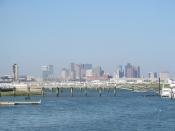Puritanism, superficially thought to be a belief in which the Church of England should be removed from Catholicism and its hierarchy, demands more of the individual than the church. It demanded the faith, strength, and determination to please God. The Puritan Dilemma, by Edmund S. Morgan, is the biography of John Winthrop, a Puritan who departs from England in order to create a haven and an example of a community where the laws of God were followed diligently. As a man with power and as a Puritan, Winthrop must face difficult decisions and at the same time make sure they are justified by God. The dilemmas, specifically paradoxes, which Puritans encountered in everyday life, were anything but simple; nevertheless, Puritans made their best effort to try and resolve them.
One paradox in Puritanism involved the relationship between man and sin. "Puritanism required that a man devote his life to seeking salvation but told him he was helpless to do anything but evil.
Puritanism required that he rest his whole hope in Christ but taught him that Christ would utterly reject him unless before he was born God had foreordained his salvation. Puritanism required that man refrain from sin but told him, "he would sin anyhow" (5). This states that people were predestined to go to heaven or be damned in hell for eternity. God chooses the future, whether they live a life of good or that of evil. The idea of predestination made its believers have various reactions. Some did their best to be good, while others lived a more carefree life. Winthrop accepted human nature. He recognized that "all men were brothers in sin" (27), yet he "must do what he could to prevent and punish evil" (27). As governor and as a person, he dissuaded from...


